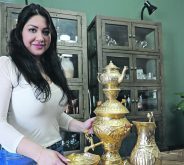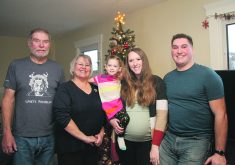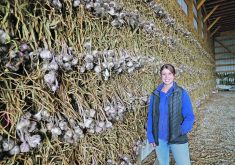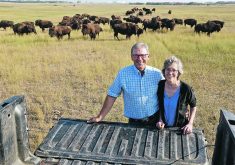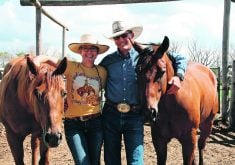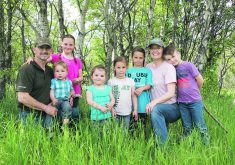BLACKFALDS, Alta. — There’s no doubt the Hoogland family in central Alberta will remember 2020.
The worldwide experience of COVID-19 would be the main reason, which has, among other things, clarified the importance of food security.
“There’s definitely more people interested in buying home-grown food,” says Sherry-Ann, who with her husband, Kurt, and three youngest children, Sophia, 15, Kolton, 13, and Evangeline, 12, raise livestock, which they direct market for meat and breeding stock at their 120-acre Majak Meadows farm.
The couple’s five older daughters are grown and on their own. Kurt and Sherry-Ann have six grandchildren.
Read Also

Nutritious pork packed with vitamins, essential minerals
Recipes for pork
Kurt’s parents, Jake and Marg Hoogland, live up the road. Jake’s green thumb is evident in the variety of vegetables and fruits growing in his well-tended 1.5 acres of market garden. They grow everything from apples to zucchini and much more.
The “much more” includes Kolton’s experiment with growing cantaloupe, watermelon and honeydew melon; each fruit in its own hotbox in a corner of the weed-free garden.
“I weed all year long,” says Jake. “Even in the fall. Every weed I pull saves 1,000 seeds.”
He also puts up deer fence, which he says “does a pretty good job” controlling those pests.
Across the way is his 2,800 sq. foot greenhouse. Flourishing in the warmth and humidity are tomatoes, cucumbers and strawberries. Earlier in the season, his flower baskets sold to an area greenhouse.
Jake’s current vegetable operation is significantly smaller than the Majak Gardens horticulture business he and Marg operated at the same location for nearly 30 years until 2004. Majak is a blend of their names.
Then for more than a decade following the close of Majak Gardens the couple experienced life a world away.
“We spent 7 1/2 years in Boliva and 3 1/2 in Nicaragua as missionary development workers.”
The younger Hooglands’ foray into animal husbandry, which began with one bull calf and a few laying hens in 2008, has grown.
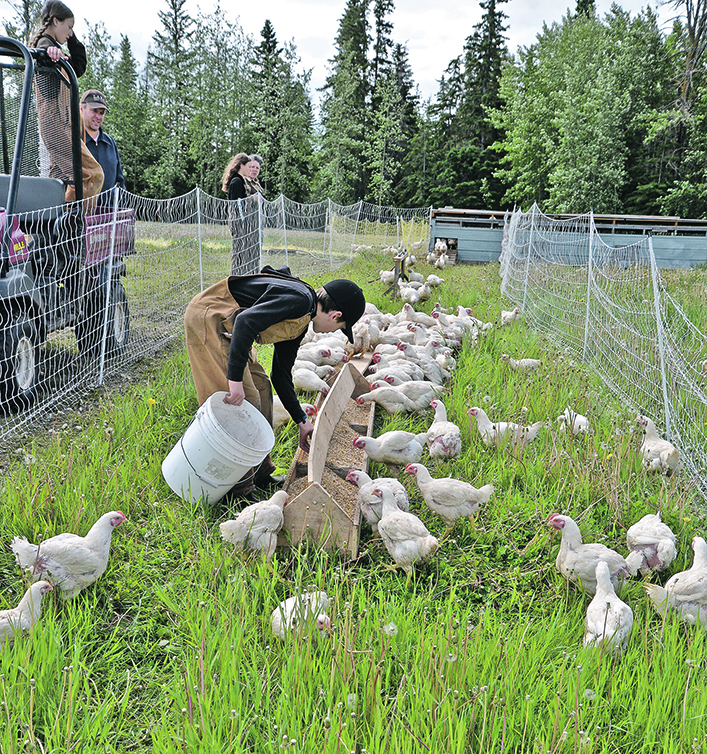
Living in lush, grass-filled meadows separated by groves of willows, poplars and fir trees are 13 Dexter cows and a bull, 32 mixed-breed ewes with about 50 lambs, a Clun Forest ram, 15 feeder pigs, 120 laying chickens, 270 meat birds, 40 turkeys, three geese and seven rabbits. Two protective donkeys pasture with the sheep. The family has just bought a bred Large Black sow.
The family does custom grazing. They also sell eggs for home use, as well as incubating more that they hatch as chicks to sell as layers.
“The kids do that,” says Sherry-Ann, referring to managing the incubation process. “Everyone wants laying hens this year.”
Sophia, Kolton, and Evangeline are also in charge of preparing rations and feeding the livestock.
Each morning Sherry-Ann and the kids leave the house to tend to the animals, followed by a couple dogs and sometimes a cat or two.
“It’s very much a family affair.”
She says that her dad told her the secret to getting kids to willingly do chores was doing them as a family.
“He was right,” she says.
Kurt helps with the evening pasture rotations.
“We do managed grazing,” he says.
The animals are moved daily. An abundance of moveable electric fence and portable chicken and rabbit pens simplify the task. There’s also black tubing to every grazing area so water can easily be provided where needed.

Kurt says the family’s interest in farming has evolved toward becoming conscious stewards of the land.
“Healthy soil leads to healthy forage, which leads to healthy animals, which leads to healthy people,” he says.
The year 2020 is also memorable due to his family’s experiences with the sheep, the part of the farm that has grown fastest.
“It’s a year of firsts,” says Sherry-Ann. “Our first year to lamb on spring pasture and the first year to deal with mastitis.”
The kids regularly travel up and down the path from home to their grandparents’ home. They work in the garden, in their grandfather’s new self-serve on-farm store, or lend a hand to their dad, who runs Majak Motorsports from the farm. His motorcycle, snowmobile, ATV, and UTV maintenance and repair shop provides the family’s main source of income.
Sherry-Ann says her homeschooled kids are learning to do by doing. Not only does the 4-H slogan apply to their annual sheep projects as members of the Crestomere 4-H Multiclub, but also to their everyday lives.
The kids work at the booths with their mom and grandfather at numerous farmers markets in the area. They might even be busking — Kolton and Evangeline on the fiddle and Sophia, the cello.
Sherry-Ann likens her position as farm wife and mother “to that of a conductor who leads the orchestra of my surroundings in the songs and music of my life.”
The words of contentment and idyllic farm photographs she shares on the Majak Meadows social media sites indicate a lovely tune.





